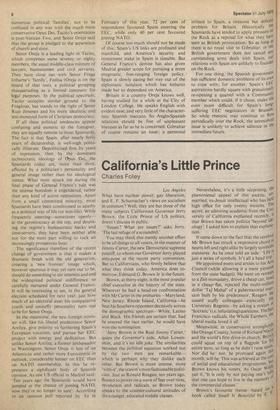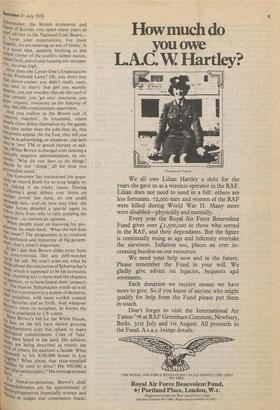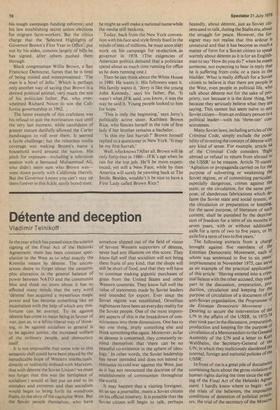California's Little Prince
Charles Foley
Los Angeles What have nuclear power, gay liberation, and E. F. Schumacher's views on socialism in common ? Well, they are but three of the many subjects Californian Governor Jerry Brown, the Little Prince of US politics, doesn't discuss in public.
'Issues? What are issues?' asks Jerry. 'The last refuge of a scoundrel.'
You may think this merely another effort to be all things to all voters, in the manner of Jimmy Carter, the new Democratic supreme pontiff, to whom our Governor Jerry played anti-pope at the recent party convention. But to Californians, who firmly believe that what they think today, America does tomorrow, Edmund G. Brown Jr is the future.
Brown, at thirty-eight, is the most popular chief executive in the history of the state. Wherever he had a head-on confrontation with Mr Carter in the primaries—Maryland, New Jersey, Rhode Island, California—he beat his Southern opponent decisively across the demographic spectrum—White, Latino and Black. His friends are certain that, had he entered the race earlier, he would have won the nomination.
'Jerry Brown is the Real Jimmy Carter,' quips the Governor's aide, Allan Lowenstein, and it's no idle joke. The similarities between the political equation worked out by the two men are remarkable— which is perhaps. why they dislike each other. But Brown is more intense, more 'with-it', the season's most fashionable polit ician. Just as Ronald Reagan, ten years ago, floated to power on a wave of fear over riots, revolution and radicals, so Brown today speaks to the counter-cultural attitudes of the younger, educated middle classes. Nevertheless, it's a little surprising, the phenomenal appeal of this ascetic, Ufl married, ex-Jesuit intellectual who has hela high office for only twenty months. Til.e secret, an admiring academic from the Unt" versity of California explained recently, is that Brown has taken politics 'beyond ide' ology'. I asked him to explain that explanation. It came down to the fact that the cerebral Mr Brown has struck a responsive chord ifl hearts left and right alike by largely symbolic measures. As he once told an aide: 'Life just a series of symbols. It's all a head trip. He appointed poets and artists to his Aro Council (while allowing it a mere pittance from the state budget). He went on retreat! to a Zen monastery, drove a cheap car, live° in a cheap flat, rejected the multi-mil1inr1 dollar 'Taj Mahal' of a gubernatorial man' sion built by his predecessor, Reagan. Ile teased stuffy colleagues—especially the, University Regents—by asking a streanl 'Socratic' (i.e. infuriating) questions. The Sall Francisco radicals, the Whole Earthers, the liberal media loved it all. Meanwhile, in conservative strongholds like Orange County, home of Richard Nig°,r1 and the world's first drive-in church, could squat on top of a flagpole for Ins entire term, so long as he didn't raise taxes.' Nor did he: nor, he promised again this month, will he. This was achieved at the CO of social and educational programmes. Brown knows his voters. As Oscar Wth"1. put it, 'It is only by not paying one's bi that one can hope to live in the memory di the commercial classes.'
Brown's favourite theme—based orl book called Small Is Beautiful by E. Schumacher, the British economist and friend of Keynes who spent many years as hief adviser to the National Coal Board's 'lower your expectations, live more f:rugallY, we are entering an era of limits'. It is a novel idea, quaintly fetching to this richest corner of the world's richest nation, Where food, petrol and housing are inexpensive, incomes high. "ow does one Lower One's Expectations in the Promised Land ? Oh, you don't buy that motor-cruiser you didn't really want, You omit to marry that girl you secretly desPise, you put wooden tiles on the roof of Your camper, you 'get into' macrame, you grow 'organic' tomatoes on the balcony of Your g80,000 condominium apartment. And you wallow in the Brown cult of creative inaction'. In lotusland, where DeoPle often define themselves by the games t,hey play rather than the jobs they do, this u,asTiotent appeal. (In the East, they tell you ineY're in advertising, or whatever; out here ihey're 'into' TM or gestalt therapy or sail 1,11g.) When Brown is charged with running a basically negative administration, he resIL°nds: 'Why do you have to do things? 'laybe by not "doing", all the lime you accomplish more.' The Governor has maintained his popuariiY at record levels for so long largely by
not risking it on tricky issues. During
California's great debate over limits on huclear power last June, no one could Persuade him—and oh, how they tried: the liNader forces detailed a special agent to 0110w Jerry from rally to rally popping the question—to venture an opinion. When people insist on knowing his protrtkanirne, he snaps back: 'What the hell does that mean? The programme is to confront e confusion and hypocrisy of big governMeni, that's what's important.' v.g It isn't just that Brown slides away from we controversial, like any poll-watcher th°,rtb his salt. He won't even say what he 'inks about the conclusion of Schumacher's b9,..°k, which is supposed to be his economic 1°Ie, claiming not to have read the chapters hit question, or to have found them 'unspeci ac.. The reason.: Schumacher winds up with iicall for conversion to a system of decentraosed socialism, with more worker control hver factories and so forth. And whatever ,1"own's views on socialism, he knows the "crd is anathema to US voters. hiSince Brown's bid for the White House, dis fans on the left have shown growing idsenchantment over this refusal to make 6ecllogical commitments. Cries of 'fake' ye been heard in the land. His achieveare being described as mostly the erk of others, his ascetism a facade. What 913ened to his S100,000 house in Los AOgeles? What about that state-supplied yeacittlac he used to drive? His 850,000 a lh.r(plussperks) salary ? His monogrammed I3r* liberal-progressives, Brown's chief ii,u ;(nYlplishments are his appointment of k,eral-Progressives (especially women and ul4eks) as judges and commission heads;
his tough campaign funding reforms; and his law establishing secret union elections for migrant farm-workers. But the critics charge that the 'Selected Highlights of Governor Brown's First Year in Office', put out by his aides, consists largely of bills he has signed, after others pushed them through.
Black congressman Willie Brown, a San Francisco Democrat, fumes that he is tired of being misled and misrepresented : 'The man is a bowl of Jello.' Which is perhaps only another way of saying that Brown is a shrewd political animal, verj, much the son of his politician father, Pat, who overwhelmed Richard Nixon to win the California governorship in 1962.
The latest example of this craftiness was his refusal to quit the nomination race until the very last moment, while candidates of greater stature dutifully allowed the Carter bandwagon to roll over them. It seemed a futile challenge; but the relentless media coverage was making Brown's name a household word around the nation. His pitch for exposure—including a television session with a bemused Muhammad Ali, who didn't seem sure who Brown was— went down poorly with California liberals. But the Governor knows you can't stay up there forever in this fickle, easily bored state : he might as well make a national name while the media still beckons.
Today, back from the New York convention with his face and style firmly fixed in the minds of tens of millions, he must soon start work on his campaign for re-election as governor in 1978. (The exigencies of American politics demand that a politician spend about as much time running for office as he does running one.) Then he can think about the White House in 1980. He wants it. His followers want it. His family wants it. 'Jerry is like the young John Kennedy,' says his father, Pat. 'It wasn't what JFK said, you know, it was the way he said it. Young people looked to him for hope.'
'This is only the beginning,' says Jerry's politically active sister, Kathleen Brown Rice, who fancies herself in the role of first lady if her brother remains a bachelor.
'Is this my last hurrah ?' Brown himself replied to a questioner in New York. 'It may be my first hurrah.'
Well, who knows?After all, Brown will be only forty-two in 1980—JFK's age when he ran for the top job. He'll be more experienced, yet still a New Face, while by then America will surely be yawning back at The Smile. Besides, wouldn't it be nice to have a First Lady called Brown Rice?




































 Previous page
Previous page